Every Corner Tells a Story: The Old Town...
Without noise or concrete, the Old...
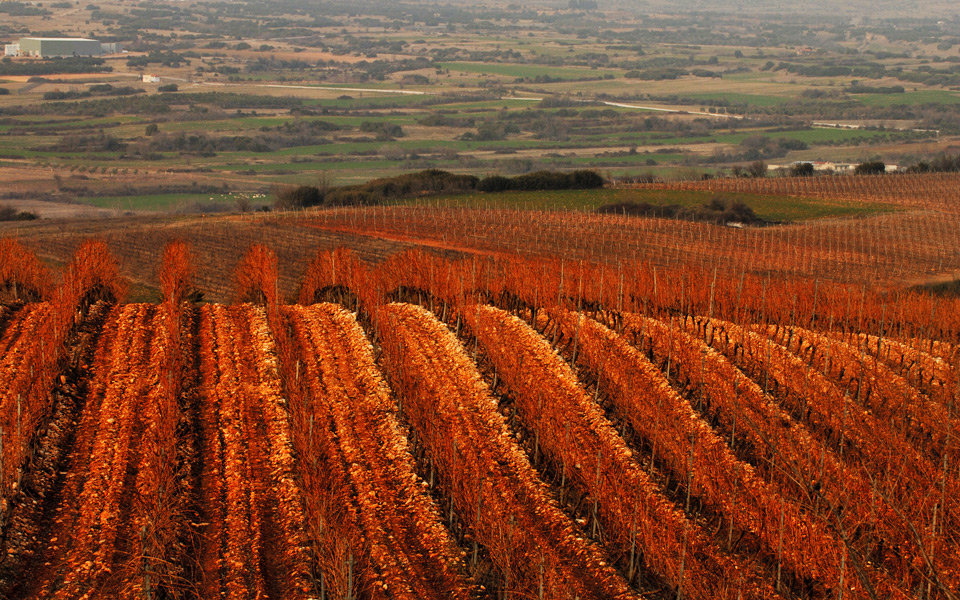
Endless fields of grape vines are where the story of Drama's celebrated wines begins
© Clairy Moustafellou
This city’s timeless charm draws heavily from its natural surroundings. The Rodopi mountain range, the Nestos River, the southernmost spruce forest in Europe in the forest of Elatia, Greece’s only birch forest, and, of course, the Frakto virgin forest – one of the planet’s most precious ecosystems – are just some of the reasons why visitors head to Drama in search of an unforgettable back-to-nature experience.
The city itself, especially its center, is blessed with many green spaces and has a particularly human quality rarely found in other Greek urban centers. The city’s Aghia Varvara Park, is a six-hectare oasis with water elements and many trees. Drama’s modern history is conveyed through the park’s surroundings, such as the impressive old tobacco warehouses and neoclassical houses, remnants of the city’s economic prosperity after 1870 a period when tobacco production and trade increased the city’s population and bolstered the local economy.
Not long after, in 1924, a tobacco warehouse belonging to a Swiss tobacco merchant, Hermann Spierer, was constructed. The most imposing of all the old warehouse structures, it currently operates as a five-star hotel, the Hydrama Grand Hotel. Launched last April, the project was warmly received, especially for the level of respect shown towards this listed, early-interwar period industrial monument. The building’s re-emergence further upgraded an already elegant area, as well as the prefecture’s hotel industry as a whole.
Hotel guests may enjoy a glass of wine at the Warehouse Wine Cellar, guided by sommelier Giorgos Samoutis. The hotel is home to a unique automatic wine dispenser with 16 offerings from Greek and international vineyards. Users first obtain a card charged with the amount they wish to spend, choose among the wines which come in 25 ml (tasting size 1-2.50 euros), 75 ml (half glass: 2-5.5 euros) and 150 ml (full glass: 4-11 euros). The wines are enjoyed in a tasteful setting accompanied by cold cuts and cheese platters.
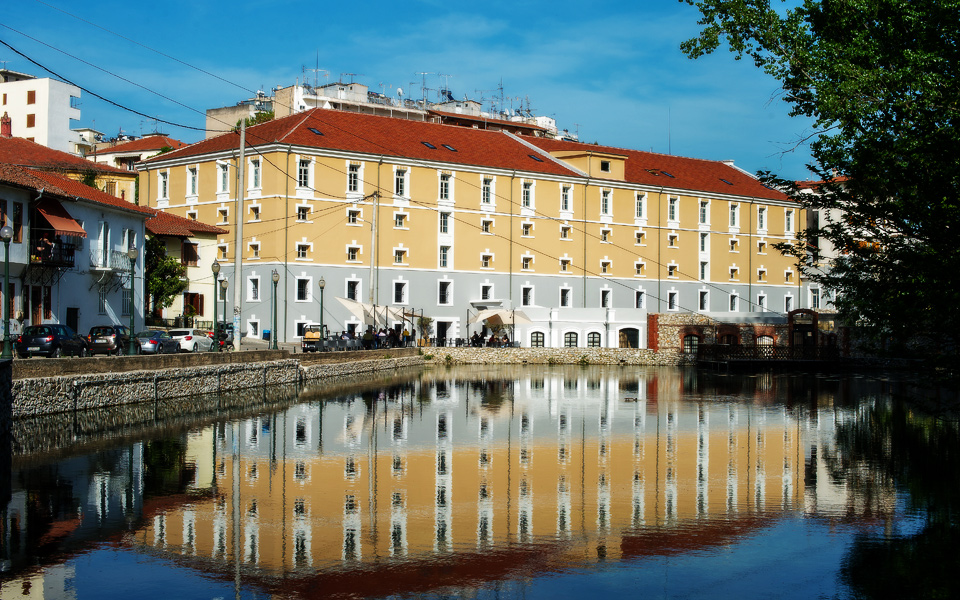
The most imposing of all the old warehouse structures, the 1924 tobacco warehouse currently operates as a five-star hotel, the Hydrama Grand Hotel
© Clairy Moustafellou
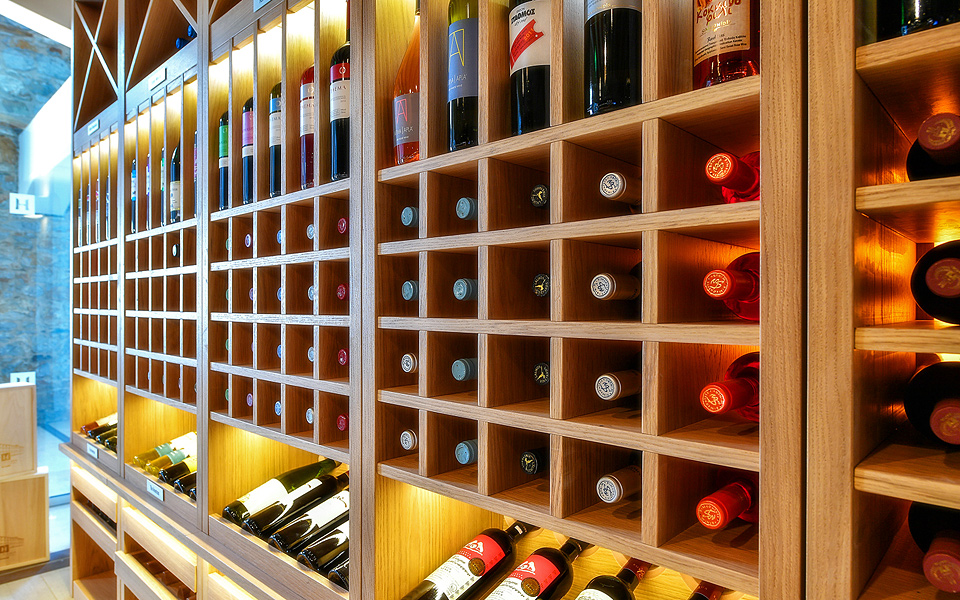
Hotel guests may enjoy a glass of wine at the Warehouse Wine Cellar
© Clairy Moustafellou
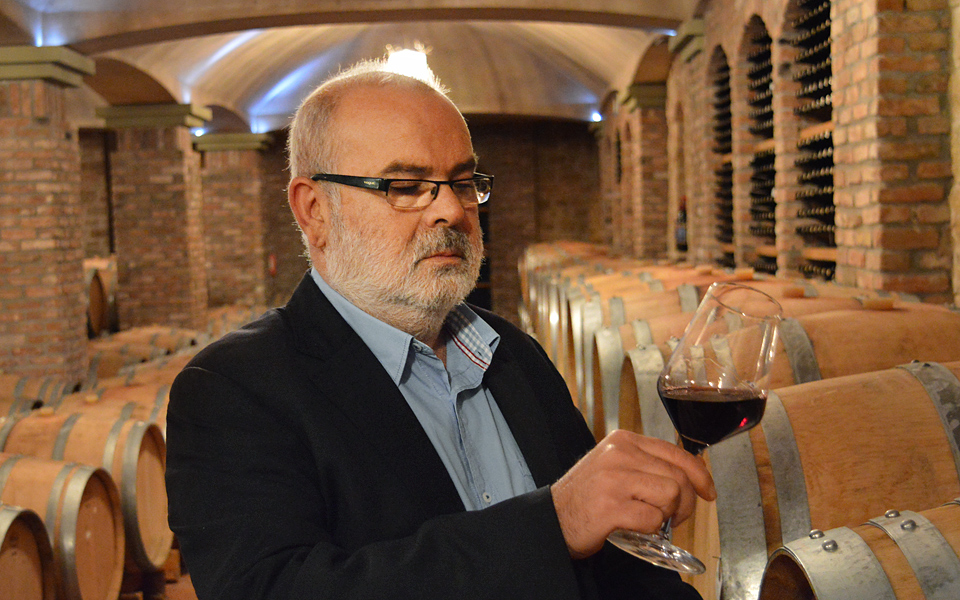
Yiannis Kalaitzidis, the president of the newly established Drama Wine Producers Association
© Clairy Moustafellou
According to Yiannis Kalaitzidis, the president of the newly established Drama Wine Producers Association, the time for the region’s wine to enter the international market has come. “At present, 500 hectares are cultivated, producing four million bottles per year, of which 40 percent are exported,” Kalaitzidis said. “Germany is our best export market and 50 percent of our wines end up there, primarily because of the restaurants run by Greek immigrants. The US and Canada are growing markets,” he added.
A decision by Drama’s winemakers to collectively promote their wines through their “Wines of Drama” campaign has, so far, produced the desired results. The winemakers coordinate to set up a joint booth at international trade fairs and roadshows. The initiative has also promoted Drama as a travel destination. Turn up in the city in May for the annual “Dramoinognosia” wine event and you’ll fall in love with the eclectic wines of Drama as much as with the place itself. Concerts and other cultural events also feature in the week-long celebration of wine.
During a trip to one the region’s seven wineries open to visitors, make sure you buy some of Drama’s excellent white wine, a mix of Assyrtiko and Sauvignon blanc which has established itself most strongly in the international market and aims to obtain PDO designation.
In recent years, Drama has developed into a key winter attraction as a result of Oneiroupoli (www.oneiroupoli.gr), the fabulous theme park modelled on Santa Claus’s village which is set up in the municipal gardens for the festive season between December 3 and January 7. Features include an ice skating rink, carousel, concerts and plays.
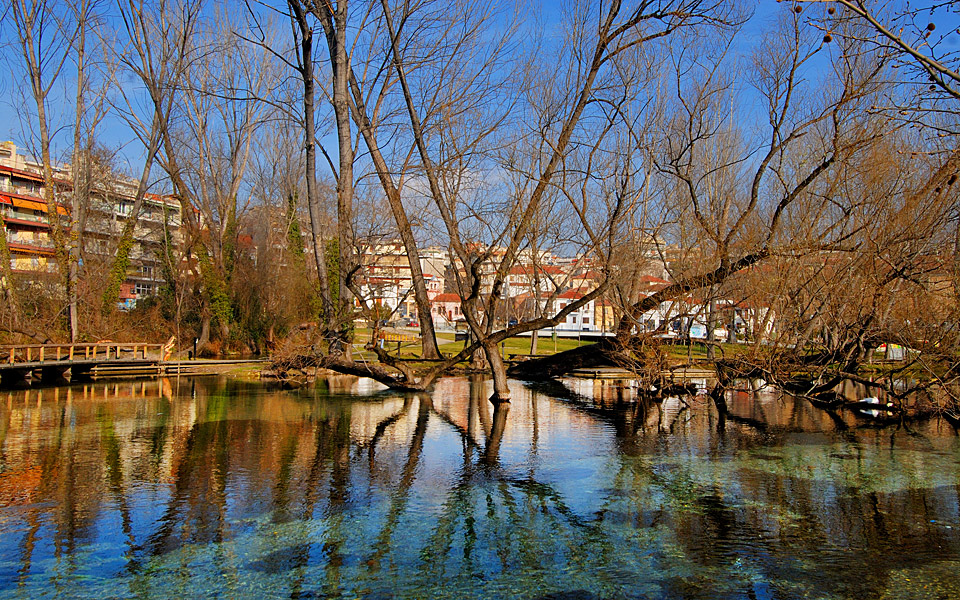
The city’s Aghia Varvara Park, is a six-hectare oasis with water elements and many trees
© Clairy Moustafellou
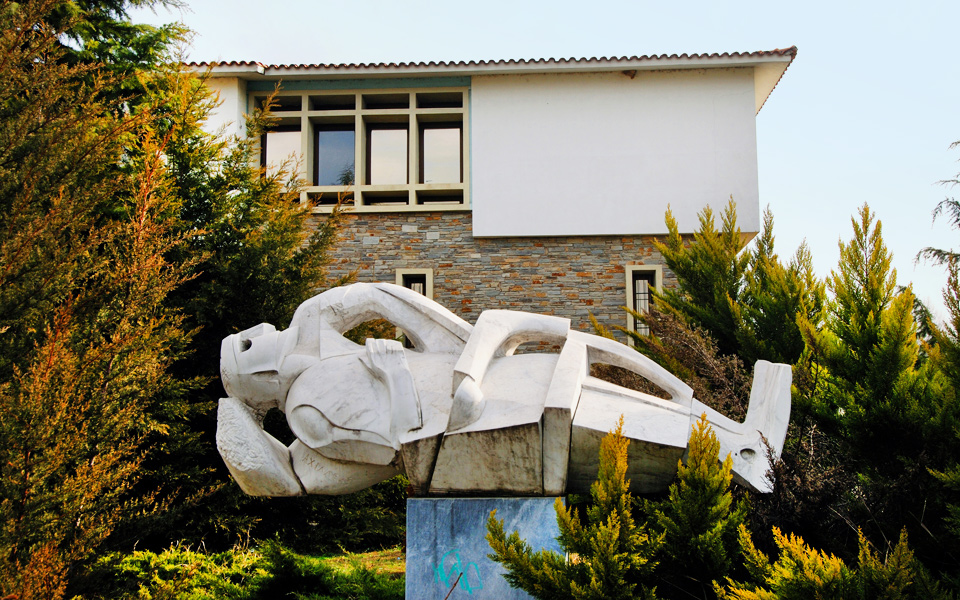
The municipal garden, located along the main road, can easily described as an outdoor art space
© Clairy Moustafellou
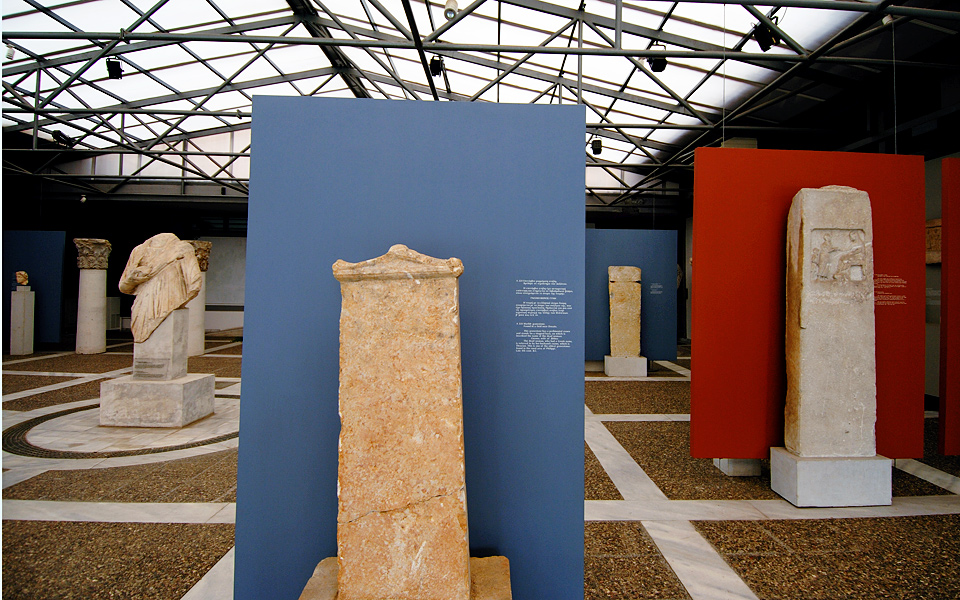
The city’s Archaeological Museum offers insight into the region’s past, from the Paleolithic Period, the Bronze and Iron Age, to the Kingdom of Philip II and Alexander the Great
© Clairy Moustafellou
Drama made it on the cultural map, initially on a domestic level, then internationally, courtesy of the city’s International Short Film Festival. It all began when a group of local film buffs running the Drama Film Club decided in the late 70s to pass on their love of cinema to others. Now an established event, the festival is held every September. As of 2017, the festival will enter its 40th year.
The city’s Archaeological Museum offers insight into the region’s past, from the Paleolithic Period, the Bronze and Iron Age, to the Kingdom of Philip II and Alexander the Great. But some of the best artifacts on display at the museum are the busts of the god Dionysus, worshipped throughout Drama during antiquity.
Carrying on from here, the municipal garden, located along the main road, Ethnikis Amynis, can easily described as an outdoor art space. Statues in various styles by sculptors from around the world are on show among the trees. They stand as a reminder of Artistic May (Kallitehnikos Maios), an innovative event that was staged in Drama at the start of the year 2000. Sculptors were invited to create and offer their works to the city.
Walking along the alleys of the old city, between the shops selling bronze and copperware and the little stores, you’ll detect the tantalizing scents of Pontic, Anatolian, Macedonian and Armenian recipes, all of which share a common passion for the rich use of spices.
The great grandchildren of the refugees who fled here after the Laussanne Treaty of 1923 know all the secrets of their cultural gastronomy. To whet your appetite, visit one of the two delicatesses which you’ll find on your way and try the pastourma (spice-preserved meat), soutzoukia (spicy sausages) and kavourma (jellied meat).
In the last three years, the focal point of Drama has moved to the streets around Eleftheriou Venizelou: little taverns, tsipouro houses and cafe-bars have brought the old town to the center stage once more, giving life once more to the old neoclassical buildings.
Begin your exploration of the city at the Archaeological Museum (2 Patriarchou Dionysiou, Tel. +30 25210.31365). Its collection of artifacts, dating as far back as the Paleolithic Period, is well displayed, while its main attractions are the busts of the god Dionysus.
On show at the Ecclesiastical Museum (168 Eleftheriou Venizelou, Tel. +3025210.32362) are treasures of priceless spiritual and artistic value, such as 13th, 17th and 19th century icons. Religious heirlooms brought over by Asia Minor and Pontus ethnic Greek refugees in 1922 are also included in the collection.
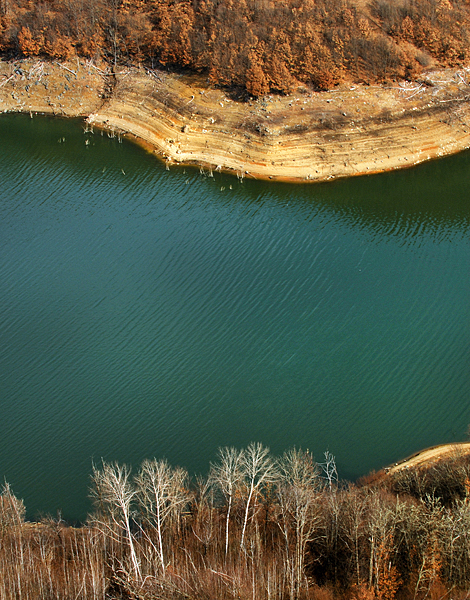
The Nestos river, one of the region's many natural attractions
© Clairy Moustafellou
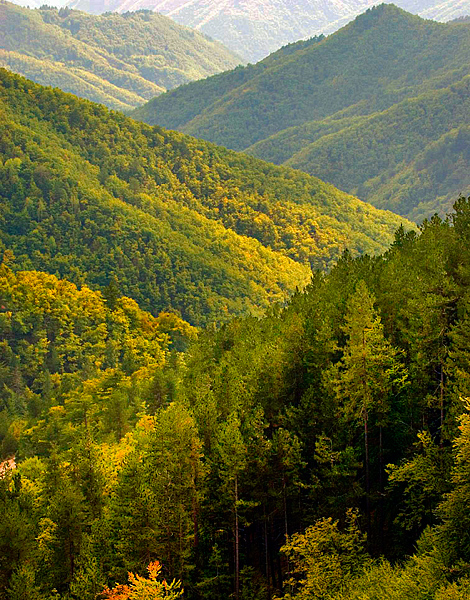
The orange-red and yellow foliage of the beech trees blend with different shades of green in the virgin Frakto forest
© Clairy Moustafellou
The beauty of the region is strongly enhanced in the autumn by the orange-red and yellow foliage of the beech trees that blend with different shades of green in the virgin Frakto forest; one of Greece’s most impressive.
It is an explosion of colors before the silence of winter, when everything is covered with snow. The Falakro Ski Center, Greece’s northernmost ski resort, at Mount Falakro, is one of the region’s key winter attractions.
A mountain retreat which can accommodate up to 80 people operates here. It is located 46k from Drama and 190k from Thessaloniki. At the village of Volaka, some of the nicests guest houses and most tempting taverns can be found. If you find yourself in Falakro, make sure you visit the cafe at the top of the ski center at a height of 2,100m. The view from the balcony is endless. On a clear day, Mount Athos, the Halkidiki peninsula and the islands of Thasos and Samothrace are all visible.
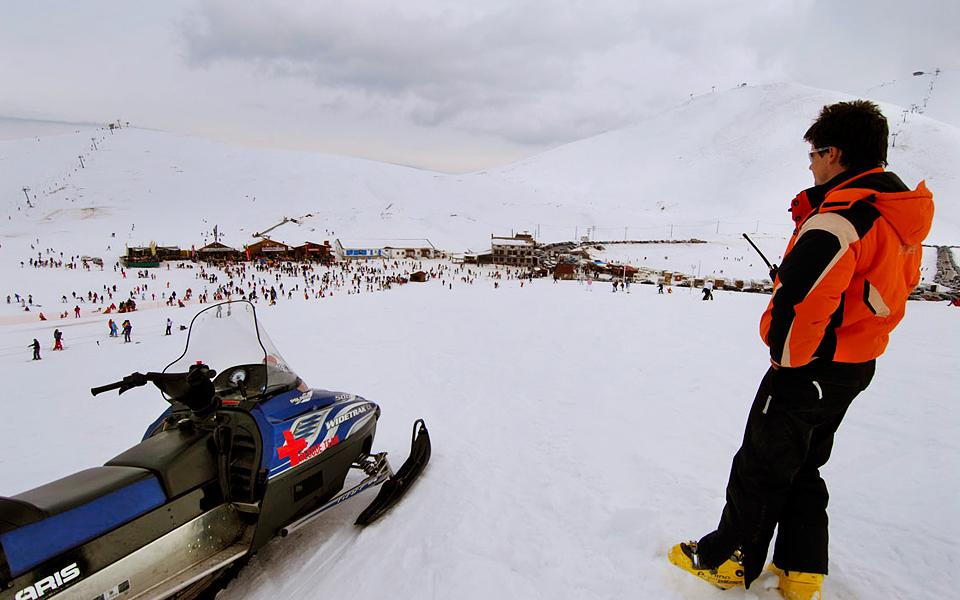
The Falakro Ski Center, Greece’s northernmost ski resort, at Mount Falakro, is one of the region’s key winter attractions
© Clairy Moustafellou
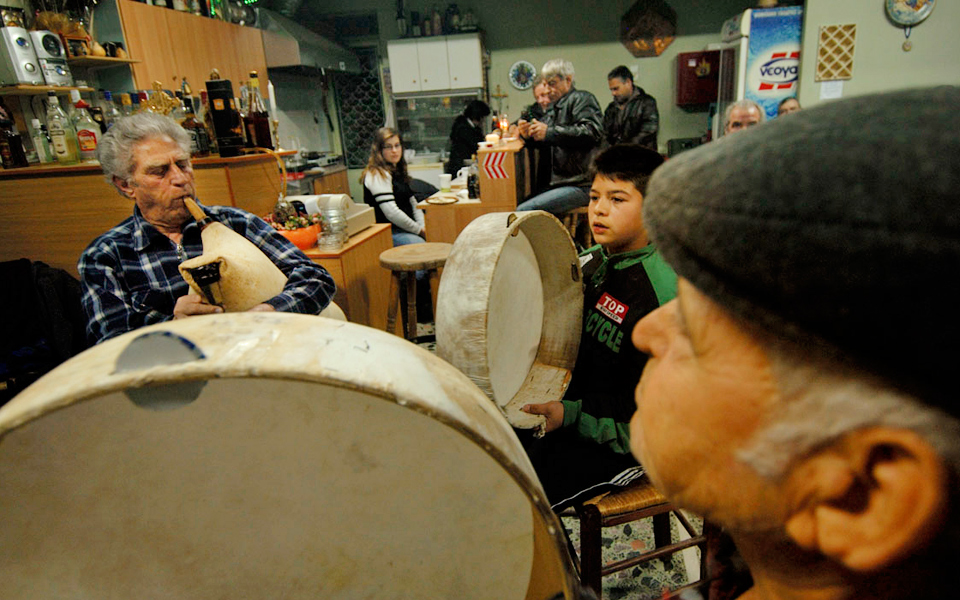
Noisy parades are held annually to herald fertility, during which participants strike large bells to awaken Mother Earth
© Clairy Moustafellou
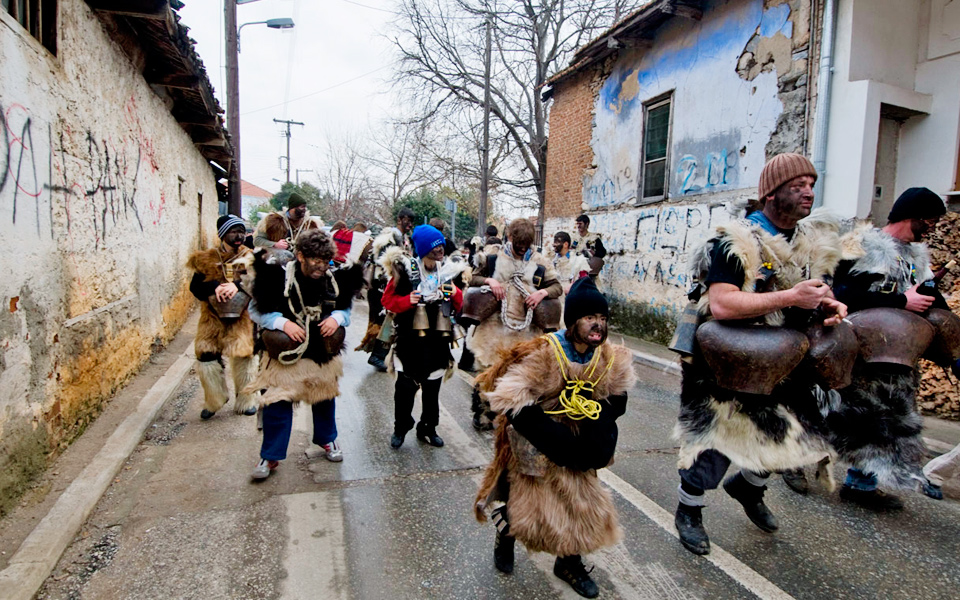
"Arkoudes" customs in the Petroudes village, part of the traditional celebrations held each January
© Clairy Moustafellou
The gods appear to have been generous to this lush natural landscape since ancient times. The earth has always provided the optimum conditions for viticulture. Dionysus, the god of wine, fertility and theater, was worshipped in the region. A temple dedicated to Dionysus, one of the few Dionysus-linked monuments discovered during excavation work around Greece, is located at the village Kali Vrysi.
The temple is dated between the 4th and 3rd centuries BC and is open to the public. The vineyards of Drama surround it on all sides. The region’s Dionysian heritage is marked by the annual Twelve-Day (Dodekaimero) celebrations, which culminate every year between January 6 to 8 in the region’s villages.
Noisy parades are held annually to herald fertility, during which participants strike large bells to awaken Mother Earth. Lots of dancing to the sound of traditional tunes, played with the gaida (bagpipe) and daire (drum), takes place over three days and three nights at the villages of Monastiraki, Kali Vrysi, Petrousa, Pyrgi and Volakas.
Drama is located 647k from Athens (7½ hours) and 147k from Thessaloniki (1½ hours).
A round trip by car including tolls and fuel costs around €235.
Without noise or concrete, the Old...
From the sacred Feast of Theophany...
Four guesthouses set in unique landscapes,...
The goddess Artemis, the Virgin Mary,...